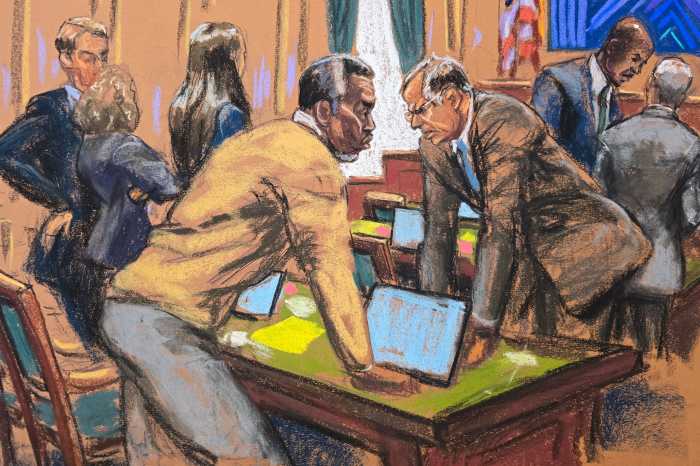Spike Lee's latest joint lacks focus
MAN BITE Ed Norton stars in Spike Lee''s latest Director Spike Lee’s preoccupation with the events of 9/11 first becomes evident during the opening credits of 25th Hour, which spotlight the infamous “Towers of Light” that emanated from Ground Zero at the end of last year. From there, 9/11 is everywhere; not simply alluded to, but prominently highlighted in numerous moments of hats-off, hands-over-heart gravity: lingering shots of a shrine to fallen firefighters, glimpses of Osama bin Laden “Wanted” posters, a tirade on the evils of Al Quaeda, and, most conspicuously, a histrionic overhead shot of Ground Zero, accompanied by bombastic swells of dramatic music. “What’s wrong with that?” you wonder as a loyal citizen of New York City. The obvious answer is “nothing,” but it’s not exactly true. Of course, there’s nothing wrong with remembering, reflecting, or even documenting the tragic events of September 11th and their aftermath, but perhaps Lee should have made a film about that—a topic of clear importance to him—rather than simply jamming the subject into a movie to which it has little relevance. As it is, he does neither 9/11 or his screenplay much justice. 25th Hour isn’t about patriotism, or heroics, or even New York City (although it is set here). Based on a novel by David Benioff, it’s about a convicted drug dealer named Montgomery Brogan (Edward Norton) tying up the various loose ends in his life on the eve of his incarceration. With only a few hours of freedom left before he’s sent upstate for seven long years, Monty reflects on his mistakes, makes peace with his father (Brian Cox), and says goodbye to his oldest friends Jacob (Philip Seymour Hoffman) and Slaughtery (Barry Pepper), as well as his girlfriend, Naturelle (Rosario Dawson). It’s clear this was intended to be an intimate character study, but none of the characters are drawn deeply enough to observe them more than superficially. Montgomery seems driven more by the fear of being raped in prison than he is by the prospect of losing his freedom. Jacob is a sad sack schoolteacher and we never learn what makes him tick. Slaughtery is introduced as a risk-taking Wall Street trader, but that information about him never pays off. Neither of them have much in common with their old friend Montgomery, other than a shared childhood. And though it’s suggested that Naturelle may have been the one who tipped off the authorities about Montgomery’s illegal activities, he doesn’t seem to give it too much thought, so there’s little reason for viewers to care. The glacial pace at which the story unfolds accentuates the grimness of the subject matter. For the longest time, the film seems to be all exposition; we wait and wait for the action to start, before eventually realizing it already has. Things simmer for what seems like an eternity, without ever coming to a boil. Any time a degree of tension is attained, it’s quickly snuffed out by yet another allusion to 9/11, or by an exasperatingly undeveloped subplot concerning a flirtation between Jacob and one of his students (Anna Paquin). As if to make up for the dull proceedings, the camera works double time. There are no lingering shots here; Lee appears to have given his editor direct orders to never let the scene remain static for more than twenty seconds. As a result, the screen flickers with quick cuts, multiple takes and angle upon angle upon angle. In an especially distracting maneuver, every embrace in the film is shown in a rapid, multi-angled double take; it’s as if the projector hiccups whenever anybody hugs.
































